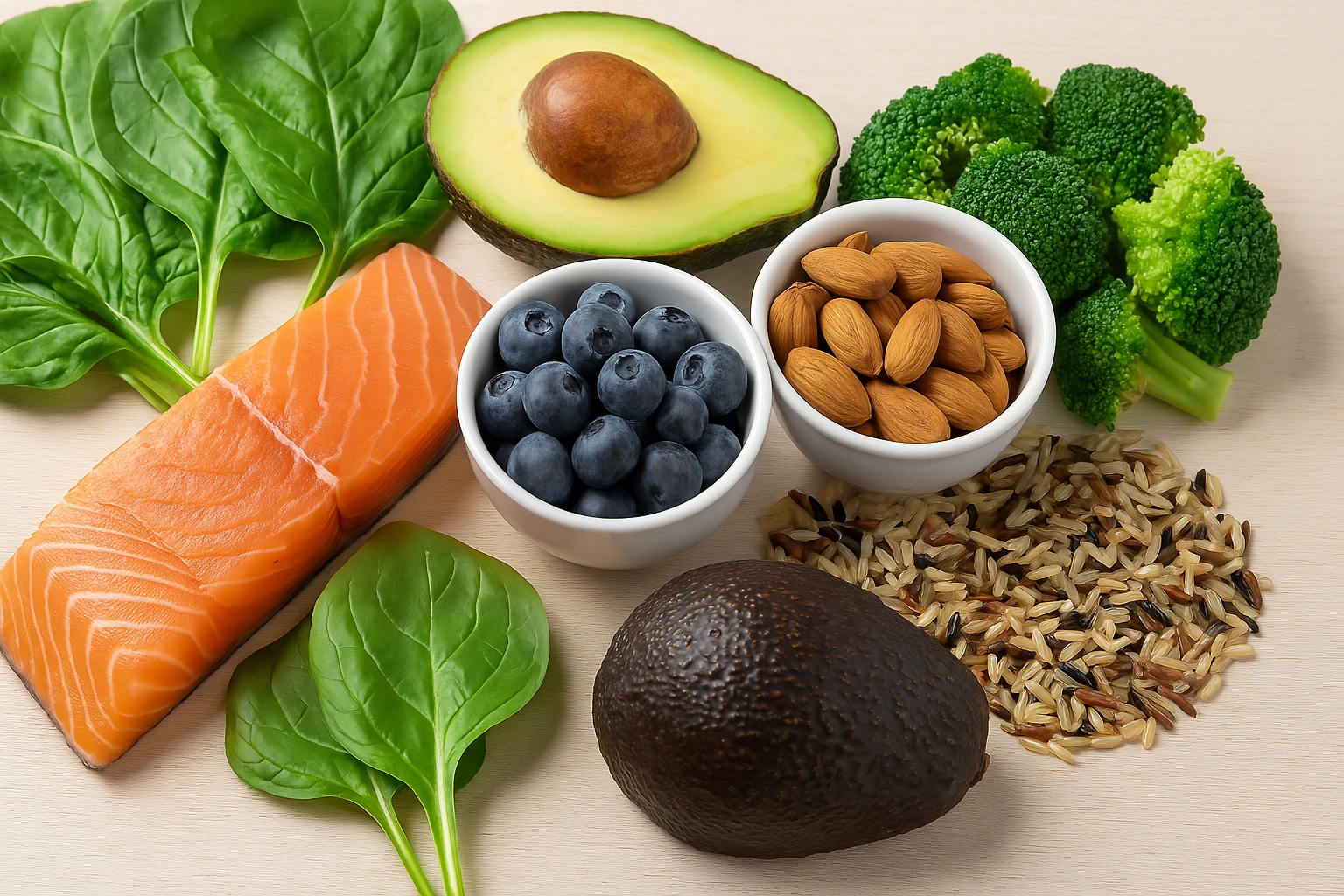Managing diabetes isn’t just about medication—it’s also about the food you eat. A healthy, well-balanced diet plays a key role in controlling blood sugar levels, which is essential for managing both type 1 and type 2 diabetes.
In fact, diet is one of the most important factors in maintaining optimal blood sugar levels and preventing complications associated with diabetes, such as heart disease, nerve damage, and kidney issues.
When you’re living with diabetes, what you eat directly affects how your body processes sugar and uses insulin. The right foods can help you stabilize blood sugar, manage weight, and keep energy levels steady throughout the day.
On the other hand, unhealthy eating habits—like consuming too many refined carbs, sugary foods, and unhealthy fats—can lead to spikes in blood sugar, making it harder to manage the condition.
The good news is that with a little planning and knowledge, you can make dietary choices that not only help control your blood sugar but also support overall health. A diabetes-friendly diet plan emphasizes whole foods, nutrient-dense meals, and balanced meals that focus on the right types of carbohydrates, proteins, healthy fats, and fiber.
In this article, we’ll guide you through the best foods to eat for optimal blood sugar control, foods to avoid, and tips for creating a balanced meal plan that fits your lifestyle. By following a few simple guidelines, you can improve your diabetes management and reduce the risk of long-term complications.
Best Foods for People with Diabetes
Eating the right foods is crucial for managing blood sugar. Here are some of the best foods to include in your diabetes diet plan:
Leafy Greens and Non-Starchy Vegetables
Non-starchy vegetables, such as spinach, kale, and broccoli, are high in fiber, low in calories, and packed with nutrients. These vegetables have a low glycemic index, meaning they won’t cause spikes in blood sugar.
Fatty Fish and Omega-3 Rich Foods
Fish like salmon, mackerel, and sardines are rich in omega-3 fatty acids, which may improve heart health and reduce inflammation. Omega-3s are beneficial for people with diabetes, who are at higher risk for heart disease.

Whole Grains vs. Refined Carbs
Whole grains, like brown rice, quinoa, and oats, are rich in fiber and help control blood sugar levels. Unlike refined grains, they are digested more slowly, preventing spikes in blood sugar after meals.
Avocados and Healthy Fats
Avocados are an excellent source of monounsaturated fats. These fats can help stabilize blood sugar levels and lower bad cholesterol. Adding avocado to your meals can improve heart health and help with blood sugar management.
Beans and Legumes
Legumes like beans, lentils, and peas are high in fiber and protein, making them an excellent choice for people with diabetes. They help control blood sugar by slowing digestion and the release of glucose into the bloodstream.
Probiotics and Fermented Foods
Foods like yogurt, kefir, and sauerkraut are rich in probiotics, which can benefit your gut health. A healthy gut microbiome is essential for overall health and may also contribute to better blood sugar regulation.
Nuts and Seeds
Nuts and seeds are high in fiber, healthy fats, and protein. They provide sustained energy and help keep blood sugar stable throughout the day.
Foods to Avoid for Better Blood Sugar Management
Not all foods are created equal when it comes to managing diabetes. Here are some foods you should limit or avoid:
Refined Grains and Processed Foods
Foods like white bread, pasta, and pastries are high in refined grains that are quickly broken down into sugar, causing spikes in blood glucose levels. Instead, opt for whole grains that provide fiber and nutrients.
Sugary Drinks and Sweets
Sugary beverages like sodas, sweetened teas, and fruit juices can cause rapid spikes in blood sugar. These drinks provide little nutritional value and can contribute to weight gain. Choose water, unsweetened tea, or sparkling water instead.
Fried and Fatty Foods
Fried foods and processed snacks are high in trans fats and saturated fats, which can impair insulin sensitivity and contribute to heart disease. Limit your intake of fried foods and choose healthy cooking methods like grilling, steaming, or baking.
Alcohol and Its Effects on Blood Sugar
While moderate alcohol consumption is generally safe for most people, it can affect blood sugar levels and interact with diabetes medications. If you choose to drink, do so in moderation, and always check your blood sugar levels before and after.
Highly Processed Meats
Processed meats like bacon, sausage, and hot dogs are high in sodium, fat, and cholesterol. These can increase the risk of heart disease, which is already elevated for people with diabetes. Choose lean protein sources like chicken, turkey, or plant-based proteins.
Fruit Juices and High-Sugar Fruits
While fruits are an important part of a balanced diet, fruit juices are often loaded with sugar and can cause a rapid increase in blood sugar. Opt for whole fruits that provide fiber, which helps slow down the absorption of sugar into the bloodstream.
Creating a Diabetes-Friendly Meal Plan
To create a diabetes-friendly meal plan, you need to balance your meals with the right foods in the right portions.
The Plate Method
One of the simplest ways to create a balanced meal is by following the plate method:
- Fill half of your plate with non-starchy vegetables (e.g., spinach, carrots, tomatoes).
- Fill a quarter of your plate with lean proteins (e.g., chicken, fish, tofu).
- Fill the final quarter with carbohydrates, such as whole grains or starchy vegetables (e.g., sweet potatoes, quinoa).
Carbohydrate Counting
Carbohydrates have the most significant impact on blood sugar levels. Learning to count carbs will help you better control your blood sugar. A dietitian can help you understand how to measure carb servings and balance them throughout the day.
Low-Carb and Low-Glycemic Index Diets
Focus on low-GI foods, which are digested more slowly and have a smaller impact on blood sugar. Low-carb diets can also be helpful for reducing blood sugar and managing weight.
Portion Control and Regular Meal Times
Maintaining regular eating schedules and portion control is essential. It helps prevent overeating and keeps your blood sugar levels stable.
Sample Diabetes Diet Plan for a Balanced Day
Here’s an example of a diabetes-friendly meal plan for someone requiring 1,200–1,600 calories a day:
Breakfast
- Whole-wheat toast with a small amount of jelly
- Scrambled eggs or oatmeal with low-fat milk
- A piece of fruit (e.g., an apple or berries)
- Unsweetened tea or coffee
Lunch
- Roast beef sandwich on whole-grain bread with lettuce and tomato
- A side of vegetables or a small salad
- Water or unsweetened iced tea
Dinner
- Grilled salmon with a small baked potato and steamed vegetables (e.g., broccoli, carrots)
- A serving of whole grains (e.g., brown rice, quinoa)
- Unsweetened iced tea
Snack
- A handful of almonds or walnuts
- A small serving of fruit or a piece of dark chocolate (70% cocoa or higher)
Final Thoughts: Building a Sustainable Diabetes Diet
A healthy, balanced diet is one of the most effective tools in managing diabetes. By choosing whole, nutrient-dense foods and avoiding those that cause spikes in blood sugar, you can maintain better control over your condition. Remember, it’s essential to work with a registered dietitian or healthcare provider to create a meal plan tailored to your needs.
| Homepage | uhmychart.org |
Embrace the long-term benefits of healthy eating—it’s not just about managing blood sugar today, but preventing future complications and improving your overall well-being.
Frequently Asked Questions (FAQs)
What is the best diet for managing diabetes?
A diet rich in whole grains, vegetables, lean proteins, and healthy fats is best for managing diabetes.
Can I eat fruit if I have diabetes?
Yes, but focus on whole fruits rather than fruit juices, and watch portion sizes.
Are low-carb diets effective for diabetes?
Low-carb diets can help stabilize blood sugar and support weight loss.
Should I avoid all sugars if I have diabetes?
Not all sugars are created equal. Focus on natural sugars in whole foods and avoid refined sugars and sugary drinks.
Can intermittent fasting help with diabetes control?
Some studies suggest intermittent fasting may help with blood sugar control, but it’s best to discuss it with your healthcare provider.






